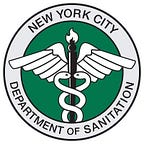Smart Bins: New Ways to Divert Food Waste, and Keep Our City Green
By NYC Department of Sanitation
New Yorkers in Astoria and Lower Manhattan looking to divert food waste from landfills now have a new option — more than two dozen “smart” compost collection bins.
We at the New York City Department of Sanitation are always looking for new ways to make our city more sustainable, and as part of two separate pilot programs, we have placed 16 bins for food scraps on the streets of Astoria and — in cooperation with the Alliance for Downtown New York — 10 bins in Lower Manhattan.
These bins complement our ongoing rollout of curbside compost collection service — now available in seven Community Board districts — and our more than 200 food scrap drop-off sites. These bins are the first to allow round-the-clock drop-off of compostable material. So, whether you’re emptying household food waste at dawn, or looking for a place to toss your compostable salad bowl on your lunch hour, these bins are accessible.
Of the 12,000 tons of trash and recycling we collect each day, up to a third of the waste stream may be compostable. When shipped to a faraway landfill, this material emits methane, a greenhouse gas far more damaging to the atmosphere than carbon dioxide. By using these smart bins– which also accept meat, dairy, leftovers, food-soiled paper and dead plants — your compostable material will be diverted from landfills to instead nourish parks and gardens and create renewable fuel.
We call these bins “smart” because either a key card or a smartphone app is used to access them (we don’t want people mistaking them for trash cans and tossing non-compostable litter). The Astoria bins are accessible with a key card, which you can apply for here — and we plan to have a mobile app available in the coming months. The Lower Manhattan bins are accessible through the mobile app eGate Digi, which you can download from Apple’s App Store or the Google Play Store, or by a QR code on the bins themselves.
Since these bins began appearing on our streets, some have asked us why we chose to place them in these two neighborhoods.
We chose Astoria as a pilot location both for its diversity in population and building stock, and because its residents have expressed a high level of interest in curbside compost collection — but the neighborhood is not yet eligible for curbside service. The bins are placed in high-traffic areas and along routes that make sense from a collection standpoint. Just as we are resuming curbside collections in areas where interest is concentrated to minimize collection truck emissions, we are trying to do the same with bin collections.
For the Lower Manhattan bins, the Smart Bin program is a public-private partnership between ADNY and DSNY to address food waste in downtown Manhattan. This is in keeping with ADNY’s ongoing interest in having a proactive and innovative approach to waste in the Financial District.
We are grateful that our partnership with the Alliance for Downtown New York has made these bins possible — and if this is successful, we would look to build similar partnerships in other parts of the city. The 10 compost bins south of Fulton Street mean that 90% of the neighborhood can find a bin within a 5-minute walk.
As this is a pilot program, we will be assessing levels of participation, feedback from users and feedback from our own Sanitation Workers on the collection routes to see if this is a service we can expand to other neighborhoods — and whether we can improve it in the process. As part of our commitment to get compostable material out of landfills, we are excited to see how these new bins perform.
In the meantime, we urge everyone who lives or works near one to give them a try.
You can find more information about the Astoria bins here and the Lower Manhattan bins here.
